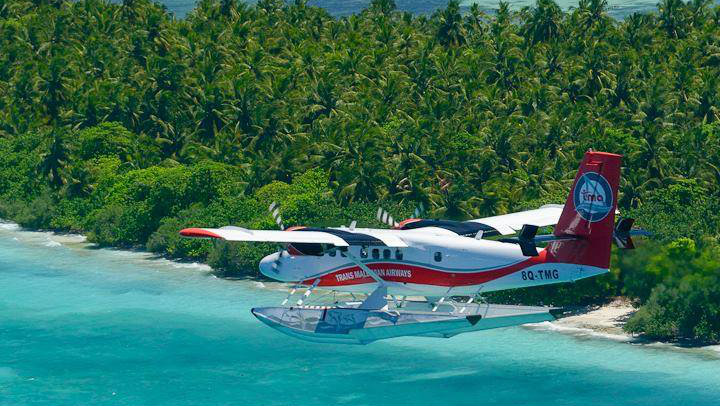The Maldives Association for Travel Agents and Tour Operators (MATATO) feels it is imperative that competition be introduced to the country’s seaplane industry to assuage fears that the resulting monopoly has negatively hit tourism.
MATATO President Mohamed Khaleel has alleged that the sale of both Trans Maldivian Airways (TMA) and Maldivian Air Taxi (MAT) to US-based private equity fund Blackstone in February of this year has already led to increased prices for guests and tour operators.
“We need to find a competitor to [Blackstone],” said Khaleel.
The merged company now operates under the TMA brand.
Several major hospitality groups operating in the country wrote to the Maldives Association of Tourism Industry (MATI) in August claiming their “worst fears” were being realised regarding the monopoly on the country’s seaplane services.
“You are of course aware that ‘The Blackstone Group’s’ recent entry into the market has had the effect of eliminating competition and creating a monopoly in the charter seaplane market in the Maldives,” wrote the CEO of a major multinational operating in the Maldives.
“We were concerned from the outset about the potential disruptions this could cause in the market and have been monitoring the situation closely.”
In the letter, the company said it was particularly concerned at several contractual points it alleged were being “forced” upon operators by TMA as a result of the seaplane monopoly.
At time of press, Minivan News was awaiting a response from both Tourism Minister Ahmed Adheeb and TMA to the allegations raised in the letter.
MATATO concerns
Aside from the impact of the increased costs being passed on to travel agents and consumers, MATATO President Khaleel alleged operators had not been receiving the same levels of support from the seaplane operator under Blackstone in order to promote the industry.
“For instance, we try to run [familiarisation] trips for journalists as part of promotion efforts for the country as a destination, every year in the past we used to get complimentary seaplane services [for promotional purposes],” he stated.
Pointing to key developments in the Maldives business sector in recent years, Khaleel said that introducing competition to the country’s communications and telecoms sector had helped lead to positive changes in price and services since the introduction of private competitors.
He expressed confidence that there was sufficient finance and know-how within the local aviation industry to try and establish a new seaplane operator locally.
Khaleel stressed that although the emergence of a growing number of domestic airports across the country was providing alternative transport options to using seaplanes, the best solution would be to encourage competitive pricing in the market by encouraging competing operators.
“There are multiple people around who can afford this to try and establish fair competition,” he added.
Blackstone “treated us well”: guesthouse operator
Meanwhile, one small hospitality group providing guesthouse accommodation in Noonu Atoll, which has recently renewed an agreement for seaplane services, confirmed it had faced successive rise in costs for the use of seaplane services over the last 12 months for a one way journey from the capital.
A one way seaplane flight to Noonu Atoll per traveller earlier this year rose to US$300 from US$260. The cost per head recently rose again to US$375 under its latest agreement signed within the last month, the operator added.
According to the guesthouse manager, the increased rates had not drastically impacted upon its operations as the property had worked with a specialist European tour operator to bring in groups of travellers – the costs therefore being absorbed into a wider package rate.
Outside of costs, the operator stressed that transport – particularly for the country’s fledgling independent travel market – was a “big issue” for their guesthouse, with the prospect of being priced out of using seaplanes potentially creating long-term difficulties for business.
“We were hoping that they would not raise the seaplane rates too much, and they didn’t,” the guesthouse manager added. “We would have otherwise had to use a recently opened domestic airport nearby, but this would be such a hassle requiring hiring a speedboat for further transportation. [The seaplane] is easy, smooth and elegant for us.”
The operator stressed that, owing to the costs already associated with using seaplanes compared to other forms of transport, its guests usually only took a one-way flight to the property itself with alternative transport arranged by sea as part of the experience.
The guesthouse manager added that seaplanes also gave an additional exotic appeal to the country as a destination, describing one tour operator as being “astonished” after their maiden flight across the country’s skies using the services.
This appeal, the operator argued, was a major additional selling point of the current package offered to guests visiting the Maldives.
“A monopoly makes it much tougher to do business, so in the long-run, I would say it could be a bit scary for the industry,” the manager stated.
Likes (6)Dislikes
(6)Dislikes (0)
(0) 